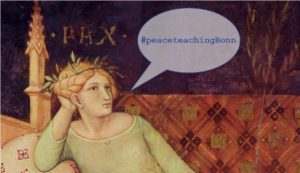Understanding and overcoming conflict
 Die dritte Sektion beschäftigt sich mit historischem Lernen und Erinnerung in Südost und Osteuropa.
Die dritte Sektion beschäftigt sich mit historischem Lernen und Erinnerung in Südost und Osteuropa.
The third section covers textbooks for historical learning and memories in Southeast and Eastern Europe.
Chair: Hans-Dieter Heumann
Snjezana Koren, 9.30 am – 10.15 am
Textbooks and interethnic conflict in Southeast Europe after the last Balkan war
[Abstract will follow]
Martin Aust, 10.15 am – 11.00 am
Germany, Poland, Ukraine, Belarus and Russia: Contested Memories of the Second World War since 1989/91
The 1990s witnessed a breakthrough of a cosmopolitan culture of remembrance in Germany. In the decades after the Second World War, Germans in the FRG were preoccupied with discourses on German victims of the Second World War suffering from allied bombing raids and the expulsion of Germans from the East. In the GDR, Germans were styled as true antifascists who had contributed their share to defeat Nazi Germany. In both German states, there virtually was no discourse on the victims of the Holocaust and the victims of Germany’s war of annihilation in the East. That started to change from the 1960/70s onward. Today, Germany’s culture of remembrance is focused on the singularity of the Holocaust and a cosmopolitan approach to memory: everybody should share his and her memories in an ongoing exchange on the past, helping to produce universal understanding. Tempi passati: in recent years, each very specific way Poland, Ukraine, Belarus and Russia underwent significant changes in their cultures of remembrance. On the whole, cultures of remembrance have switched from cosmopolitan to antagonistic. In each country there are rivaling visions of the past in general and the Second World War in particular. Further, bilateral relations between these countries and Germany as well have become strained over competing approaches to the past. This contribution charts the state of affairs in contested memories in relations between Germany, Poland, Belarus, Ukraine and Russia by having a look at official politics of history, local memorial activists, monuments, commemoration ceremonies, films and history textbooks.
Tatiana Khripachenko, 11.30 am – 12.15 pm
Post-Soviet Openness to the “West” in Russian school textbooks
Recent policy of school historical education in Russia presupposes creation of a single historical master-narrative, which offers a uniform interpretation of problematic moments of Russian history. It also pursues the aim to instill patriotism. With some variations the narrative is based on the following plot. Before the disintegration of the USSR, Russia had been in isolation from advanced countries of the West. In the long run this caused technological backwardness of the Soviet economy. Under the leadership of Mikhail Gorbachev and Boris Yeltsin, Russia opened itself to the West, hoping that the rejection of communism and acceptance of western values would integrate Russia into the international community. However, instead of providing friendly support, western countries used Russia’s compliance for their own ends. With the president Vladimir Putin coming to power, Russia acquired new identity and sought to deal with the West on equal terms, regarding other countries as competitors in the struggle for prosperity.
My paper will compare various versions of this narrative and the way they portray the “West.” In the textbooks of Russian history this narrative is seen more clearly. Western countries are regarded as Russia’s natural rivals, while the main responsibility for Russia’s failures is laid upon Yeltsin’s and Gorbachev’s naïve attitude towards the West. The textbooks on World history take more sociological approach. They tend to present Post-Soviet developments as an expression of objective processes and disregard the agency of particular politicians.
+++ The conference has been cancelled due to the unforeseeable spread of Coronavirus +++
Zitierweise / How to cite:
Peter Geiss, Michael Rohrschneider: Abstracts Section III – History teaching and textbooks in Southeast and Eastern Europe, 02.03.2020, in: Histrhen. Rheinische Geschichte wissenschaftlich bloggen, http://histrhen.landesgeschichte.eu/2020/03/peaceteachingbonn-section-three/